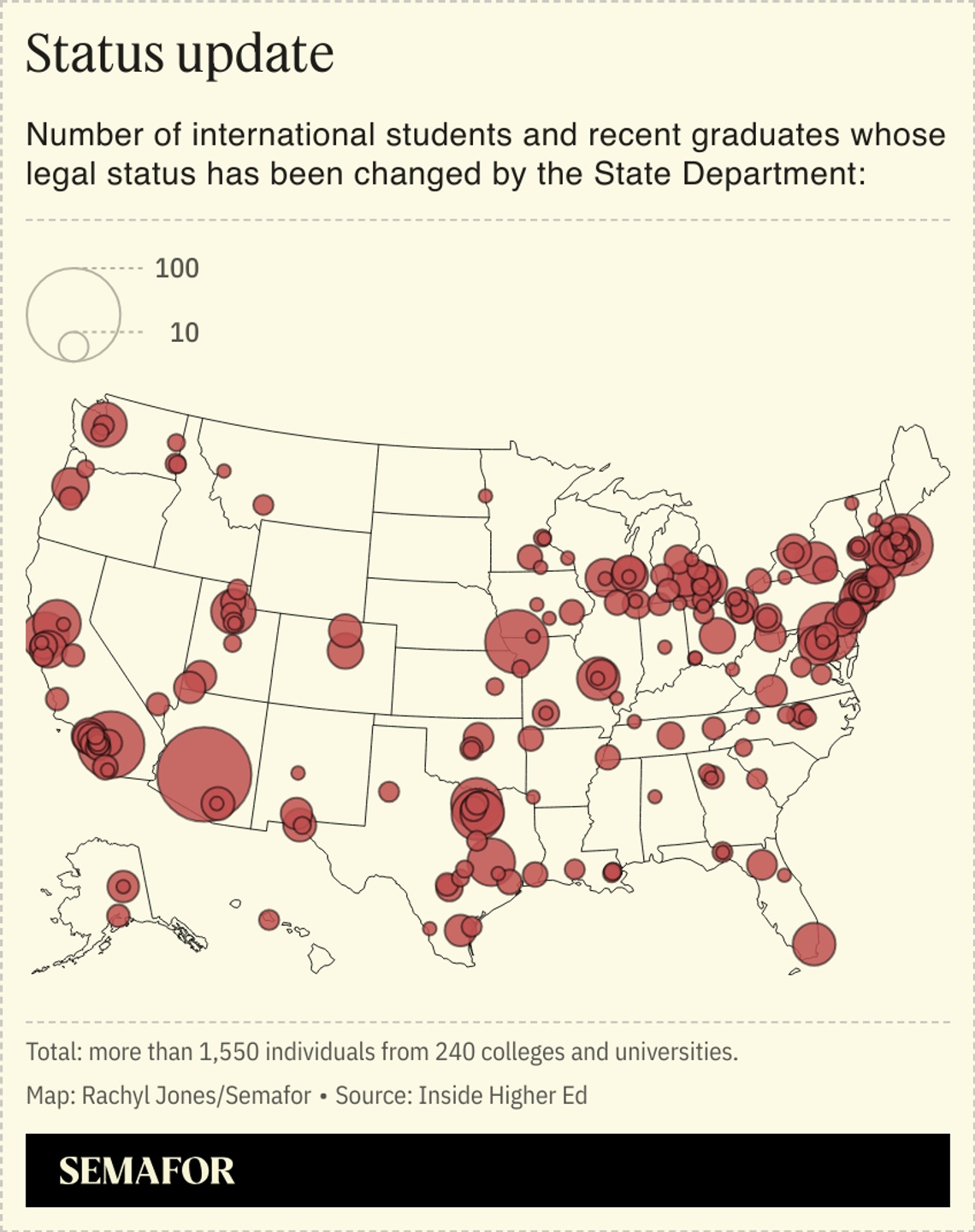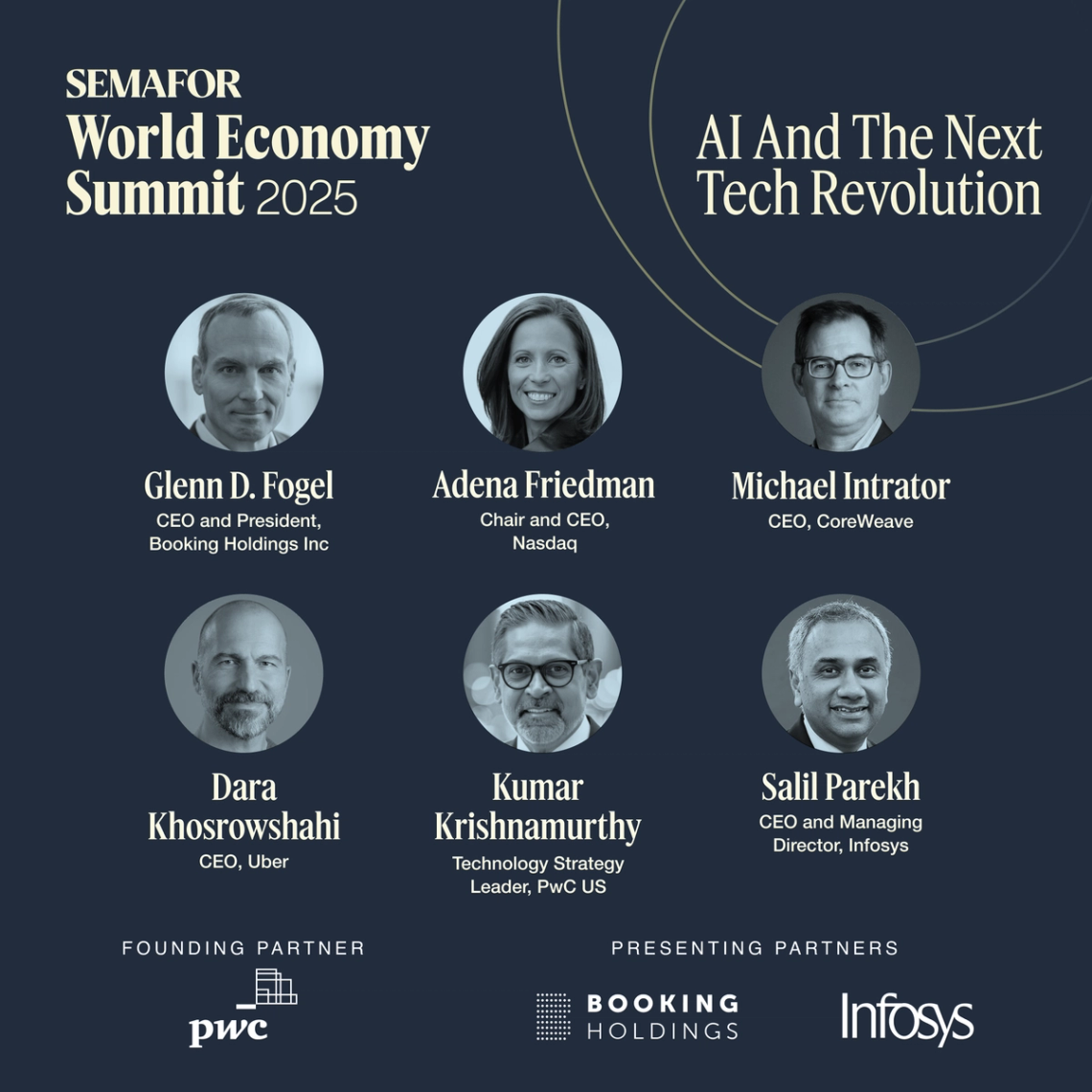| | In today’s edition, how gen AI is disrupting the ad economy regardless of Google’s antitrust case, a͏ ͏ ͏ ͏ ͏ ͏ |
| |  | Technology |  |
| |
|
 | Reed Albergotti |
|
Hi, and welcome back to Semafor Tech. Google lost its second big antitrust case this week — and that may be the best thing that could happen to the search giant. Even as its lawyers fight to overturn this verdict, and a ruling last year, they may spur the company to accelerate its pivot toward disrupting its own paralyzingly lucrative core search business. Google advertising makes up just under 80% of parent Alphabet’s top line. That cash cow allowed Google to make autonomous taxis, quantum computers, and the world’s leading AI model — but it also allowed the company to over-hire, sit back, and move cautiously. Google is arguably the global leader in AI — but it saw OpenAI and others run with breakthroughs that came out of Google’s own labs. Now, generative AI is on the cusp of revolutionizing the digital ad economy, and even the very concept of a mobile operating system. The harsher the legal remedies Google faces, the more pressure there will be for the company to speed up its deployment of AI, and force it to become leaner and faster. In that sense, the antitrust authorities will have done their jobs. Next week: Look out for me at our World Economy Summit, April 23-25 in Washington, where more than 200 CEOs are getting together. I’m looking forward to seeing many of you, but if you can’t be there, follow our virtual broadcast here — and I’ll be back in your inbox on Wednesday and Friday with highlights of the conversations. ➚ MOVE FAST: Hands on. New Intel CEO Lip-Bu Tan is shaking things up and flattening the management structure, with chip groups reporting directly to him, according to Reuters. The storied company is looking to revamp its ability to innovate after years of wrong turns. ➘ BREAK THINGS: Handouts. Meta CEO Mark Zuckerberg has gotten a lot of mileage from training leading AI models and giving them away for free. But there may be a limit to what Facebook can afford to open source. The Information reports Zuckerberg asked rival firms like Microsoft to help fund the effort. So far, there aren’t any takers.  Mario Anzuoni/Reuters Mario Anzuoni/Reuters |
|
To catch a protester. Police departments near the US-Mexico border are using AI from startup Massive Blue to gather information on individuals they believe have broken the law, potentially leading to arrest, WIRED and 404 Media jointly reported. The company creates bots that interact with suspects like college protesters, escorts, and traffickers on social media and online criminal networks. The technology can aid police departments in baiting and apprehending presumed pedophiles and human traffickers. But the use case of tracking college protesters and other activists is sure to spark concerns, especially as the Trump administration targets the visas of international students who participated in protests against the war in Gaza.  It highlights the murky ethics of some emerging AI technologies. While they can help keep communities safe, critics question the need to target certain individuals: “I’m not concerned about escorts. I’m not concerned about college protesters,” said an Electronic Frontier Foundation director. “So like, what is it effective at, violating protesters’ First Amendment rights?” Massive Blue has not yet led to any known arrests, the publishers reported. |
|
 The amount of money OpenAI has spent on users saying “please” and “thank you” to its models, Sam Altman said on X. Nearly 70% of people are polite to chatbots according to a survey from publisher Future — with 12% of all surveyed saying they’re nice to be spared in case of a robot uprising. |
|
 Kimberly White/Getty Images for TechCrunch/Flickr/CC BY 2.0 Kimberly White/Getty Images for TechCrunch/Flickr/CC BY 2.0Anthropic made its first ever startup investment in a company called Goodfire, aimed at garnering a deeper understanding of AI models. It’s worth noting because Anthropic is a leader in this space, which is central to AI safety. One of the fascinating things about the “reasoning” trend in AI models is that you can watch them “think.” Instead of running a model once and getting the results, these reasoning models run the same prompts on different processors at the same time, so they ultimately get to a better single result. You can watch those results spill in (saying very simplified here), and it looks like an inner monologue. Sometimes, that monologue is all about how to deceive or withhold information from the user. But for people worried about the AI apocalypse: What happens when the models are “smart enough” to hide their deception better? Of course, these models aren’t actually thinking, and they don’t have malice. They’re just prediction engines. But on some level, if a model goes down a path where it’s predicting the outputs of what an evil AI model might do, it could still wreak havoc on anything it’s able to access. In other words, if these models are going to be released into the world, we should probably figure out exactly why they are making the decisions they’re making. Another counterpoint: The current reasoning trend will ultimately hit a plateau and be replaced by some other AI method. In the end, so-called “super intelligence” will actually be created by an AI model itself — one that is better at making AI models than humans. From there, it’s a debate based on science fiction. Either way, the interpretability industry looks like it’s going to be growing a lot. |
|
 Glenn D. Fogel, CEO and President, Booking Holdings Inc.; Adena Friedman, Chair and CEO, Nasdaq; Michael Intrator, CEO, CoreWeave; Dara Khosrowshahi, CEO, Uber; Kumar Krishnamurthy, Technology Strategy Leader, PwC US; Salil Parekh, CEO and Managing Director, Infosys, and more will join the AI and the Next Tech Revolution session at the 2025 World Economy Summit. This session explores how AI is reshaping business and society, and how leaders are addressing its complex challenges in governance, access, and policy. April 25, 2025 | Washington, DC | Learn More |
|
 Windsurf/YouTube Windsurf/YouTubeOpenAI is in talks to purchase vibe coding startup Windsurf for about $3 billion, in what would be OpenAI’s largest acquisition to date, Bloomberg reported. Windsurf, formerly known as Codeium and a favorite among many software developers, generates code from text prompts, significantly expediting the process of creating new apps, products, and features. OpenAI had previously looked into buying Windsurf competitor Cursor, but the talks didn’t progress, CNBC reported. While OpenAI does offer code generation tools, it’s far from the leader in the space. The Windsurf deal would have it compete more closely with Cursor, Anthropic, and Microsoft, which owns GitHub Copilot. Vibe coding, which didn’t have a widely acknowledged name until Andrej Karpathy coined it two months ago, has been the latest rage in Silicon Valley. It promises to lower the barrier to entry for coding and speed up legacy processes, which could provide an unprecedented boost to the world of software development. It’s also driving some of the latest capital infusions and bolstering AI’s market value as a whole. Windsurf’s roughly $3 billion price tag is more than double its $1.25 billion value in August. Cursor-maker Anysphere was worth $2.5 billion in January and was last month discussing a valuation of four times that, Bloomberg reported. |
|
 LinkedIn/G42 LinkedIn/G42Abu Dhabi’s artificial intelligence company G42 is planning to use more than 800,000 DNA samples it gathered from the city’s population to build an AI model that will help develop new drugs and offer precision medicine, Semafor’s Kelsey Warner reports. The UAE is fashioning itself as an “AI-centric nation,” G42’s CEO Peng Xiao said during a health-focused conference this week, and it aims to become a hub for life sciences. Abu Dhabi is courting big pharma, people familiar with the matter told Semafor, including UK pharmaceutical company AstraZeneca and US firm Eli Lilly, as well as cutting-edge device makers, like New York-based brain-computer interface startup Synchron — a competitor to Elon Musk’s Neuralink — for clinical trials and manufacturing. G42 sees US President Donald Trump’s recent pullback in funding for medical research and disease prevention — which reports say could amount to up to $40 billion in cuts — as an opportunity to advance research in the country. “Whatever is not being done in the US, we will do it here in Abu Dhabi,” an executive at G42’s health unit said. |
|
  Zhang Xiangyi/China News Service/VCG Zhang Xiangyi/China News Service/VCG“I don’t remember a time that we didn’t have uncertainty,” Otis CEO Judy Marks says of the five years since the $40 billion elevator and escalator group she leads spun off as an independent company. Otis Worldwide was spawned from a break-up of United Technologies that investors pushed for because of the persistent underperformance of the parent company’s stock, Semafor’s Andrew Edgecliffe-Johnson writes. It returned to the New York Stock Exchange at an unpromising time — April 2020 was just weeks into the COVID-19 pandemic. Five years later, however, shares in Otis have roughly doubled, narrowly beating the S&P 500 index and far outpacing listed rivals Schindler and Kone. |
|
|












